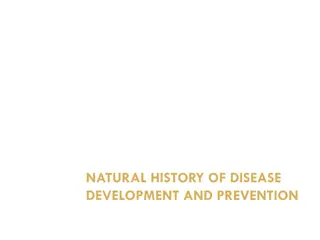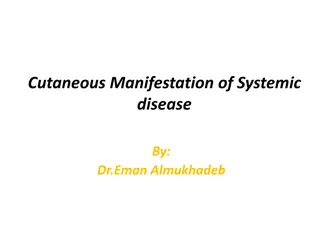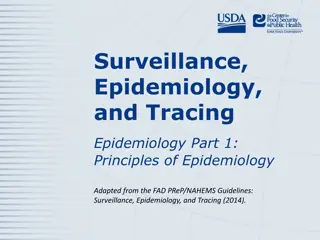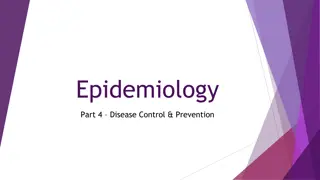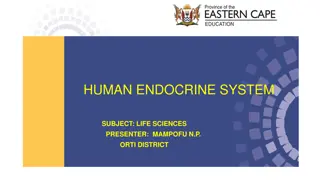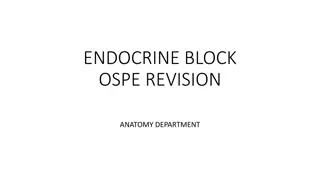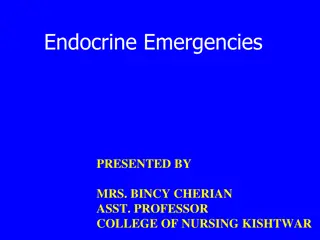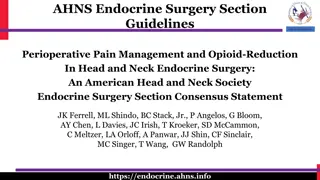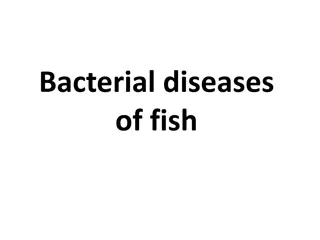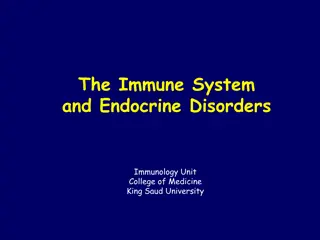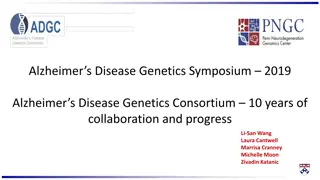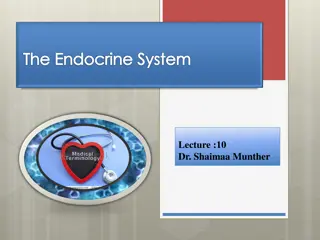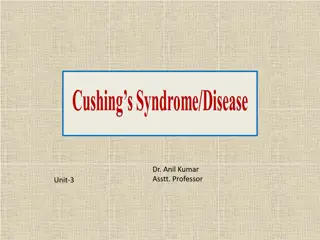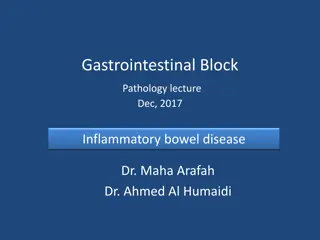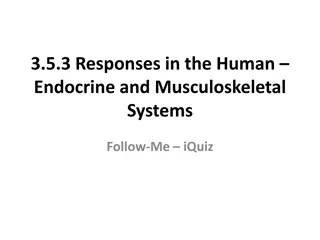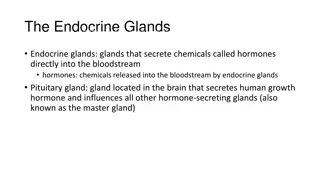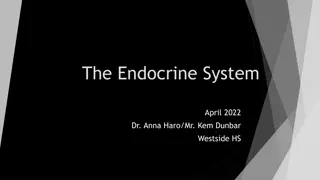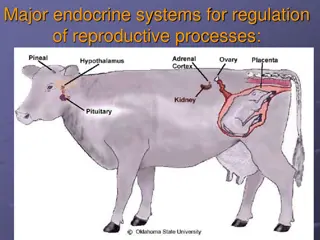Understanding the Natural History of Disease Development and Prevention
The natural history of disease development outlines the progression of a disease in an individual without intervention, from exposure to outcome. Learning objectives include defining prevention terms, understanding disease severity, prevention levels, and intervention measures. Studying disease prog
4 views • 16 slides
Understanding Diseases Associated with Homeostasis in Endocrine, Nervous, Immunological, and Genetic Levels
Exploring diseases related to disruptions in homeostasis at endocrine, nervous, immunological, and genetic levels, focusing on conditions like hormone imbalances and metabolic disorders such as growth hormone deficiency and diabetes. Learn about the impact on health and the body's intricate regulato
5 views • 38 slides
Comprehensive Overview of Pancreas Function and Structure
Pancreas is a vital organ in the abdomen with dual exocrine and endocrine functions. As an exocrine organ, it secretes digestive enzymes and bicarbonates into the duodenum for food breakdown. In its endocrine role, the pancreas regulates blood sugar levels by secreting insulin, glucagon, somatostati
1 views • 16 slides
Cutaneous Manifestations of Systemic Diseases: Endocrine Disorders and Diabetes Mellitus
Explore the cutaneous manifestations of systemic diseases, particularly focusing on endocrine disorders like diabetes mellitus. Learn about the dermatologic signs associated with conditions such as hypothyroidism, hyperthyroidism, Addison's disease, and Cushing syndrome. Discover specific manifestat
0 views • 88 slides
Principles of Epidemiology: Understanding Disease Occurrence and Surveillance
Epidemiology is the study of disease patterns, factors influencing disease occurrence, and the core functions of surveillance, field investigation, and analytic studies. It involves understanding disease characteristics, natural history, and evaluating the effectiveness of activities to mitigate dis
1 views • 25 slides
Insights into Tyzzer's Disease: An Overview of a Bacterial Infection in Laboratory Animals
Tyzzer's disease is an acute bacterial infection affecting rodents and rabbits, caused by Clostridium piliforme. Discovered in 1917 by Ernest Tyzzer, the disease is characterized by necrotic lesions in the caecal mucosa, liver, and heart. Initially known as Bacillus piliformis, it was later renamed
2 views • 21 slides
Understanding Disease Control and Prevention in Epidemiology
This article discusses disease control processes in epidemiology, including reducing disease incidence, duration, and transmission. It covers public policy interventions, elimination, eradication, and extinction of infectious agents. It also highlights preventable causes of disease and different lev
2 views • 10 slides
Understanding Adrenal Androgens and Their Role in the Endocrine System
Explore the significance of adrenal androgens in the endocrine system, including their production, function, and impact on male and female physiology. Learn about conditions like adrenogenital syndrome and the crucial role of adrenal cortex in hormone synthesis.
0 views • 14 slides
Overview of Shock Classifications and Causes
Shock is classified into different types such as Hypovolemic, Cardiogenic, Obstructive, Distributive, and Endocrine shock. Hypovolemic shock results from fluid loss, while Cardiogenic shock is due to heart failure. Obstructive shock occurs from mechanical obstructions, whereas Distributive shock is
1 views • 11 slides
Overview of Human Endocrine System in Life Sciences Presentation
This content provides a detailed examination guideline for understanding the human endocrine system in the field of life sciences. It covers essential topics such as the difference between endocrine and exocrine glands, hormone functions, gland locations with functions, and key terminology related t
1 views • 17 slides
Endocrine Block OSPE Revision - Anatomy Department Presentation Slides
Explore this set of presentation slides prepared by the Anatomy Department for Endocrine Block OSPE Revision. The slides cover essential topics related to endocrine anatomical structures and functions, providing a comprehensive resource for revision and review.
0 views • 11 slides
Extended Endocrine Therapy Guidelines for Breast Cancer Patients
Extended adjuvant endocrine therapy may benefit breast cancer patients with poor or intermediate prognosis, but may have little value for those with good prognosis. Risks include osteoporosis and venous thromboembolism. Different treatment options are available for postmenopausal and premenopausal w
0 views • 9 slides
Understanding Glands: Endocrine and Exocrine Systems
Glands play a crucial role in the body by producing and releasing substances for specific functions. Endocrine glands release hormones directly into the bloodstream, while exocrine glands secrete substances through ducts onto bodily surfaces. Different types of exocrine glands, such as sweat glands,
3 views • 22 slides
Understanding Endocrine Emergencies and Diabetes Mellitus
The endocrine system plays a crucial role in regulating various bodily functions through hormone release. This presentation by Mrs. Bincy Cherian delves into endocrine emergencies, specifically focusing on Diabetes Mellitus. It explains the differences between Type I and Type II diabetes, their clin
3 views • 28 slides
AHNS Endocrine Surgery Section Guidelines: Perioperative Pain Management and Opioid Reduction
The American Head and Neck Society Endocrine Surgery Section provides consensus statements on perioperative pain management and opioid reduction in head and neck endocrine surgery. Addressing the opioid addiction crisis, the expert panel offers guidelines on pain management strategies, opioid prescr
0 views • 18 slides
Screening for Peripheral Vascular Disease in Patients with Coronary Artery Disease
Patients with coronary artery disease should be screened for peripheral vascular disease as it is a frequent integrator of global cardiovascular risk. The association of atherosclerosis in various arterial diseases highlights the importance of identifying multisite artery disease. The prevalence and
0 views • 23 slides
Human Disease Symptom Network: Understanding Disease Relationships Through Symptoms and Genes
The Human Disease Symptom Network (HSDN) is constructed using a large-scale medical bibliographic records database to form a network of human diseases based on symptom similarities. By integrating disease-gene associations and protein-protein interaction data, correlations between symptom similarity
0 views • 37 slides
Understanding Hormones and their Role in the Body
Hormones are chemical messengers that play a crucial role in regulating various metabolic functions in the body. They are transported through the bloodstream to tissues and organs, affecting processes like growth, metabolism, and reproduction. Some hormones have autocrine and paracrine effects in ad
0 views • 25 slides
Exploring the Endocrine System as the Third Temple of our Body
Delve into the fascinating connections between the endocrine system and biblical references, likening its functions to the operations of the Tribe of Asher. Discover how this system, composed of glands producing hormones, impacts growth, metabolism, and sexual development. Explore the intricate netw
0 views • 24 slides
Understanding Bacterial Diseases of Fish: Columnaris Disease Overview
Columnaris disease, also known as Saddleback disease, is a common bacterial infection in fish that is often brought about by poor handling and high stress levels. This disease manifests as tail and fin rot, leading to rapid fish mortality. The causative organism, Cytophaga (formerly Flexibacter), is
0 views • 21 slides
Understanding the Interplay of the Immune System and Endocrine Disorders
Explore the intricate mechanisms of immunological damage to endocrine glands, focusing on disorders like Graves disease, Hashimoto's thyroiditis, type I diabetes, and Addison's disease. Delve into the association of autoantibodies with pathogenic and diagnostic significance, uncovering the complexit
0 views • 33 slides
Endocrine Potpourri: Adrenal Insufficiency and Incidentalomas - Case-Based Review
This endocrine potpourri covers various cases involving adrenal insufficiency, adrenal crisis, adrenal incidentalomas, and patient education. It includes a detailed case presentation, treatment guidelines for adrenal crisis, patient education on adrenal insufficiency, and evaluation of adrenal nodul
0 views • 62 slides
Decoding Genetics: Insights from Alzheimer's Disease Symposium to Type 2 Diabetes Study
Explore the latest findings from the Alzheimer's Disease Genetics Symposium 2019 on disease mechanisms, drug targets, and genetic pathways. Dive into the progress made by the Alzheimer's Disease Genetics Consortium over the past decade. Transition to a Genome-Wide Association Study uncovering suscep
0 views • 42 slides
Understanding the Endocrine System: Key Concepts and Functions
The endocrine system, consisting of glands that release hormones into the bloodstream, plays a crucial role in regulating various body processes like metabolism, growth, reproduction, and stress response. Key glands include the pituitary, thyroid, pancreas, adrenal, ovaries, and testes, each produci
0 views • 34 slides
Metastatic Breast Cancer Treatment and Progression Overview
Mrs. GV, a 78-year-old woman with endocrine-resistant hormone-positive metastatic breast cancer, presented with dyspnea. Her medical history includes chronic fatigue syndrome, hypothyroidism, and hypertension. Disease progression led to dermal and intraocular metastasis, managed with treatments like
0 views • 16 slides
Liver Disease Burden in Tower Hamlets
Dr. Somen Banerjee, Director of Public Health in London Borough Tower Hamlets, highlights the concerning liver disease mortality rates in the area, with high incidence of cirrhosis, cancer, and hepatitis B and C. The data reveals a significant burden of liver diseases such as Non-Alcoholic Fatty Liv
0 views • 18 slides
Understanding Cushing Disease in Dogs and Cats
The pituitary gland, or "Master Gland," plays a crucial role in hormone regulation in the body. Cushing disease, a common endocrine disorder in middle-aged to older dogs and cats, is often caused by tumors in the pituitary or adrenal glands. Symptoms include increased thirst, appetite, panting, obes
0 views • 22 slides
Understanding Inflammatory Bowel Disease: Crohn's Disease and Ulcerative Colitis
Inflammatory Bowel Disease (IBD) encompasses Crohn's disease (CD) and ulcerative colitis (UC), chronic conditions with immunologic basis. This article delves into the epidemiology, pathophysiology, and differences between CD and UC, highlighting clinical features, pathology, and complications like a
0 views • 42 slides
Understanding Responses in Human Endocrine and Musculoskeletal Systems
This interactive quiz explores key concepts related to the human endocrine and musculoskeletal systems, including exocrine glands, bone structures, hormone functions, and more. Test your knowledge on these vital systems and their responses through engaging questions and answers.
0 views • 50 slides
Understanding How Hormones Interact: The Endocrine System
The endocrine system comprises glands that release hormones into the bloodstream, influencing various bodily functions. Key glands include the pituitary, pineal, thyroid, pancreas, gonads, and adrenal glands, each playing a crucial role in regulating metabolism, growth, stress response, and reproduc
0 views • 5 slides
Understanding the Endocrine System: Hormones, Glands, and Regulation
The endocrine system, comprising glands such as the pituitary, thyroid, pancreas, and more, produces hormones that regulate various bodily functions. These hormones target specific cells with receptors, influencing metabolism, growth, energy usage, and more. By understanding how hormones interact wi
0 views • 12 slides
Understanding the Endocrine System: Glands and Hormones in Detail
Explore the intricate details of the endocrine system, focusing on key glands like the thyroid, parathyroid, adrenal, pancreas, and thymus, their functions, hormone secretion, and role in maintaining physiological balance through hormonal regulation mechanisms.
0 views • 13 slides
Understanding the Endocrine System: Functions, Organs, and Disorders
The endocrine system, essential for bodily functions and growth, consists of key parts such as the hypothalamus, pituitary gland, thyroid gland, and more. It helps maintain homeostasis and can be affected by environmental factors like drugs and stress, leading to conditions such as Cushing syndrome.
0 views • 9 slides
Understanding the Endocrine System: Functions and Glands Explained
Explore the intricacies of the endocrine system with a focus on its functions such as metabolism, growth, emotions, and more. Learn about key endocrine glands like the hypothalamus and pituitary, their roles in hormone regulation, and their impact on various bodily processes. Discover the significan
0 views • 17 slides
Overview of the Human Endocrine System
This presentation covers the terminology, differences between exocrine and endocrine glands, the location and functions of various glands in the endocrine system, and general information on how hormones coordinate the body's organs to maintain homeostasis.
0 views • 17 slides
New Horizon for Overcoming Hormonal Treatment Resistance in Metastatic Breast Cancer Patients
Breast cancer, particularly estrogen receptor-positive tumors, poses a significant challenge due to endocrine resistance. While endocrine therapy is effective, resistance can occur in both early and advanced stages of the disease. This presentation discusses novel approaches to address this resistan
0 views • 21 slides
Endocrine Systems in Reproductive Regulation
The endocrine system plays a crucial role in regulating reproductive processes by secreting hormones that influence cellular activity. This system involves ductless glands like the hypothalamus, pituitary gland, and other endocrine glands working together in a feedback mechanism. Hormones of various
0 views • 19 slides
Ultrastructural Alterations of Renal Tissue in a Male Patient with Fabry's Disease
Fabry's disease is a rare X-linked lipid storage disorder characterized by deficient lysosomal alpha-galactosidase A activity. This condition primarily affects males, leading to chronic kidney disease and progression to end-stage renal disease. Kidney involvement is a critical aspect, and high doses
0 views • 24 slides
Exploring the Intricacies of Mitosis, Neurons, and Endocrine System
Delve into the world of biology and neuroscience with detailed images depicting mitosis, chromatids, equator, spindle fibres, diploid and haploid cells. Explore the journey from stem cells to tissues and organs, including the Central Nervous System (CNS) components like cerebellum, cerebrum, and med
0 views • 72 slides
Overview of Endocrinology: Coordination of Body Functions by Chemical Messengers
The body's functions are coordinated by various chemical messenger systems, including neurotransmitters, endocrine hormones, neuroendocrine hormones, paracrines, autocrines, and cytokines. Endocrine hormones travel through the circulatory system, binding to receptors in cells to regulate metabolism,
0 views • 18 slides
